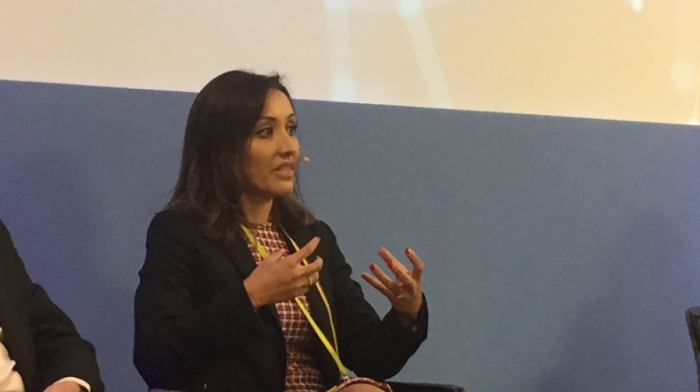Data sharing between private and public sectors would be crucial to delivering a hybrid healthcare system of the future, according to Vitality deputy chief medical officer Dr Anushka Patchava.
Dr Patchava (pictured) was pitching a 2030 hybrid healthcare model for the UK as part of a Dragon’s Den style session at the Association of British Insurers’ annual conference.
She explained that consumers of healthcare want three things – access to timely care, convenience and cost effectiveness.
In order to meet these needs, Dr Patchava revealed the product of the future would enable people, after initial diagnosis on the NHS to be able to top-up their National Insurance and access private sector services, including 24/7 primary care appointments and timely access to secondary care when required, leveraging technology and multi disciplinary healthcare professionals, to deliver personalised services tailored to the patient’s age or demographics.
As a digital-first product it would also enable customers to access digital health including digital therapeutics, remote patient monitoring and digital outpatient treatments promoting preventative and rehabilitative care.
Critically the key to delivering the product is data fluidity between public and private health systems, patients (or consumers) to own their data and for insurers to be trusted to access to electronic health records.
“This has never happened in the global health system,” Dr Patchava said. “There’s smidgens of it in America and there’s smidgens of it in Singapore, but realistically true collaboration between public and private health systems remain the panacea of healthcare.
“It’s unique because it helps us relieve the burden on the NHS, it helps all stakeholders have a better understanding of populations. If we can access the data, we can run the analytics and can then contribute to preventative healthcare measures and play a role in public health.
“It would also helps us as insurers to provide faster, more accurate underwriting to create products that meet our customer needs. Through personalised services and products we can address these needs and improve population health.”
And Dr Patchava added data sharing can also make cost-effective healthcare a possibility.
“We know that cancer care is unsustainable right now, we know that some of the treatments that exist right now are unsustainable,” she added.
“Through data fluidity, true collaboration, predictive analytics including risk stratification and smart technology we can get incrementally closer to making healthcare more sustainable in the future.”
The product managed to receive the backing of the conference audience – with 68% saying they were “in” as opposed to 32% who said they were “out”.
